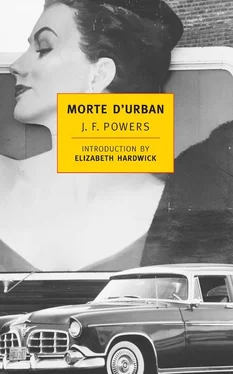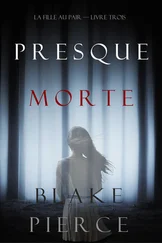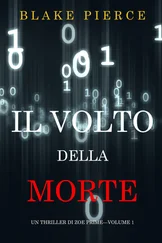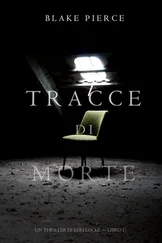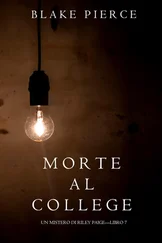“You know it doesn’t hurt for the laymen to see us like this,” he told his dirty charges toward the end of their first day on the sacristy job. They’d just had a visit from a roofing salesman. “Too many of ’em think the priesthood’s a bed of roses.”
On the other hand, when Father Chmielewski appeared, as he did on the following afternoon, Wilf, forewarned, wore a cassock, met him at the front door, ushered him into the office, and kept him there for the duration of the visit. “I thought of bringing him back here to meet you, Urban, but I didn’t want him to see you like this.”
“Thanks,” said Father Urban.
“He’s definitely a pastor of the old school, and in view of all that’s happened lately, I thought I’d better not risk it. I wanted to, in a way. Too many of the secular clergy think we have it too easy.”
Father Chmielewski had delivered Jack’s wallets but not his pants, Wilf was happy to say, and since Father Chmielewski hadn’t mentioned them or his own (and certainly Wilf hadn’t) it only remained for Jack to return Father Chmielewski’s on Saturday. Jack should hang them up neatly when he arrived. Jack should not spill any more coffee. Jack should not get Father Chmielewski’s mixed up with his own when he dressed on Sunday morning. Unless Father Chmielewski said something, and this now seemed very unlikely, Jack should say nothing.
In the days right after Christmas, Father Urban received a half-dozen requests for his services as a speaker — and turned them all down. To give Wilf no serious trouble, but also to lay no golden eggs for him, was once again Father Urban’s policy. Since Wilf prized the workman in Father Urban above all else, that was what he would get.
Wilf knew what was happening, too, for he made it his business to answer the telephone, and he had a way of loitering in the office when the call was for Father Urban. Maybe he figured that a man who drank on the job might have a girl friend, but probably he was just curious. In any case, there was too much of the house dick about Wilf to suit Father Urban — who, however, spoke freely in his presence. “No, I’m sorry. Maybe one of the other fathers could make it. Oh, you wouldn’t? I see. Ill? No, just don’t feel up to it. We’re taking the house apart here. That’s right. Renovations. Why don’t you call back in a month or two? Thanks for calling.”
“Another minor group with major program problems,” he’d say to Wilf, and wouldn’t be able to tell him exactly who had called. That was what got Wilf, you could see, really got him, though he tried not to show it. Opportunities to speak (outside of church) were rare in Wilf’s experience, and he would’ve snapped them all up, but he couldn’t very well act like it.
The secretary of a Catholic business and professional women’s group in Great Plains had the nerve to solicit Father Urban’s services on a post card, which was like trying to take a whale on a bent pin. He tossed the card into Wilf’s wastebasket. “Hey, that’s an important organization!” cried Wilf who, it appeared, had read the card. “Then we’ll be hearing from her again,” Father Urban said, and he was right. A few days later, the secretary phoned to find out whether Father Urban had received her card.
“Oh, a card,” he said, watching Wilf squirm. “Maybe you’d better start from the beginning then. I see. You meet once a month except during the summertime, and the Bishop’s your moderator. Did you talk this over with him? Well, you’d better do that. He’s asked you not to call him — why’s that? Trusts you to carry on your fine program, to check with him only when it’s necessary. He hasn’t been able to come to the last two meetings? I see. But you’re sure there’ll be no objection from him. Well, now, I’ll tell you what to do. You get in touch with your moderator, if possible, and get him to write to the rector here. That’s Father Wilfrid. His name is spelled with two i’s —two i’s as in Ignatius. And try to give us a choice of dates. Of course I know the Bishop’s busy — he’s the busiest priest in the diocese, you might say — but we’re pretty busy ourselves. Still, one of us might be able to make it. Me? That’ll be for Father Wilfrid to decide. Won’t be any trouble about transportation, will there? From Duesterhaus? About a mile from downtown Duesterhaus. That’s right. So you get in touch with your moderator, and after we hear from him, if it’s at all possible, I’ll come. Father Wilfrid. That’s right. Two i’s . And thanks for calling.”
Wilf appeared somewhat shaken by what he’d heard. “But what if the Bishop doesn’t write?”
“Frankly, I’ll be surprised if he does.”
“Just playing hard to get, eh?”
“Not a-tall. Why should I knock myself out for somebody who sends me a post card? How do I know it isn’t just this woman’s idea to have me come and give a talk? How do I know the Bishop would be there for it? I gather he isn’t very good about coming to meetings. The point is, if we’re going to oblige this group, the Bishop ought to be the one to invite us. When that happens, why, then, there’ll be some reason to go. I have no illusions about talking to women’s groups.”
“And if he doesn’t invite us?”
“Then I don’t think we should go.”
“I see what you mean. Yes.”
“I knew you would.” Wilf could appreciate the theory, but the practice frightened him. Wilf’s natural tendency was to give up and eat the bait.
He was pleasantly surprised by the number of requests being received at the Hill for speakers, he said that evening at table. In fact, he wondered if they shouldn’t give some thought to starting up “a speakers’ bureau” at the Hill. “The idea has possibilities,” he said, and kicked it around for a while. He suggested, among other things, that Brother Harold might give chalk talks to teenagers. “Well, we’ll see,” he said, finally shutting up.
Jack had shown no enthusiasm for a speakers’ bureau, and Father Urban, when asked for his opinion, had said, “I really wouldn’t know. I’ve always worked alone.” Father Urban was annoyed with Wilf for presenting the idea as he had — as if more than one man were in demand at the Hill. Actually, it was a dangerous idea. For who, with Father Urban on the menu, would want Wilf, Jack, or Brother Harold? Wilf, to preserve the fiction of a bureau, would be sending himself or Jack (“also well known”) out on Father Urban’s bookings. Then hard feelings would arise between the Order and the groups who had contracted to hear Father Urban, and, yes, between members of the community at the Hill. The idea had possibilities all right — for all kinds of strife.
Perhaps Jack recognized this. “Well…” he said the following evening, after Wilf had raised the matter again.
“I grant it might conflict to some extent,” Wilf said, “with our other work.”
“I turned down a couple of people today for that very reason,” Father Urban said. “I just don’t have much left in the evenings.”
Wilf, after a slight pause, said, “Father and I were speaking of the work we’ll soon be doing here, Father.”
“Oh,” said Father Urban, as if he hadn’t known. Perhaps he wasn’t playing fair with Wilf, but then Wilf — in this matter and others — wasn’t playing fair with him.
The lights went out.
“Did you do something out there?” Wilf called into the kitchen.
“No, Father,” Brother Harold called back, and a moment later he came into the refectory carrying a dim flashlight.
“Turn it off,” Wilf said, and when this had been done — to save the batteries — he continued the inquiry in total darkness. “You didn’t have your mixer on, did you?”
Читать дальше
